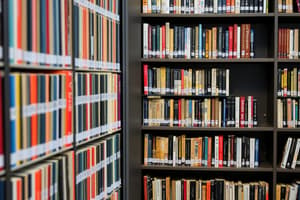Podcast
Questions and Answers
What is the primary goal of the International Association of Library and Information Science (ILA)?
What is the primary goal of the International Association of Library and Information Science (ILA)?
To advocate for the ethical and effective use of information.
How does copyright law protect the rights of creators?
How does copyright law protect the rights of creators?
It grants exclusive rights to reproduce, distribute, and create derivative works.
What is an example of an exception to copyright law, and why is it important for LIS professionals?
What is an example of an exception to copyright law, and why is it important for LIS professionals?
Fair use allows limited use for purposes like education and criticism.
In the context of academic law, what do faculty rights typically include?
In the context of academic law, what do faculty rights typically include?
What role does the ILA play in the development of library and information science practices?
What role does the ILA play in the development of library and information science practices?
What is the significance of understanding copyright law for LIS professionals?
What is the significance of understanding copyright law for LIS professionals?
Name one legal issue covered under academic law.
Name one legal issue covered under academic law.
How does copyright law impact the creation of derivative works?
How does copyright law impact the creation of derivative works?
Flashcards
Library and Information Science (LIS)
Library and Information Science (LIS)
A field that focuses on managing and sharing information, including collecting, organizing, and making information accessible.
LIS Professionals
LIS Professionals
Professionals who work in libraries, archives, and other information-related settings. They manage information resources, develop services, and provide guidance to users.
Collection Development
Collection Development
The process of choosing which materials to add to a library collection, considering factors like relevance, audience, and budget.
Cataloging and Classification
Cataloging and Classification
Signup and view all the flashcards
Copyright Law
Copyright Law
Signup and view all the flashcards
Fair Use
Fair Use
Signup and view all the flashcards
Academic Law
Academic Law
Signup and view all the flashcards
Academic Freedom
Academic Freedom
Signup and view all the flashcards
Study Notes
Library and Information Science
- Library and information science (LIS) is a multidisciplinary field focused on organizing, accessing, and utilizing information.
- LIS professionals apply information science, computer science, and library science principles to manage and disseminate information.
- Core functions include collection development, cataloging, classification, information retrieval, and user services.
- LIS professionals work in diverse settings like academic libraries, public libraries, special libraries, archives, and digital information management.
International Association of Library & Information Science (ILA)
- The International Association of Library and Information Science (ILA) is a global professional organization for LIS professionals.
- It advocates for ethical and effective information usage, promoting global information practices.
- ILA fosters member networking through conferences, publications, and other activities.
- It develops standards and best practices in library and information science.
Copyright Law
- Copyright law protects creators' rights to original works (literary, dramatic, musical, etc.).
- Copyright automatically applies upon creation in a tangible medium.
- Copyright owners have exclusive rights to reproduction, distribution, display, performance, and derivative works.
- Exceptions exist, like fair use, allowing limited use for criticism, comment, news reporting, teaching, scholarship, or research.
- Understanding copyright is crucial for responsible material use in LIS.
Academic Law
- Academic law, or higher education law, addresses laws concerning universities, colleges, and institutions of higher learning.
- This encompasses institutional governance, faculty rights, student rights, intellectual property, and financial aid.
- Key areas include academic freedom, tenure, and disciplinary procedures for students and faculty.
- Understanding academic law is vital for fair and appropriate practices in the academic community.
- It overlaps with fields like contract law, property law, tort law, labor law, and constitutional law (regarding free speech and academic freedom).
- Academic law varies by legal jurisdiction.
Studying That Suits You
Use AI to generate personalized quizzes and flashcards to suit your learning preferences.




